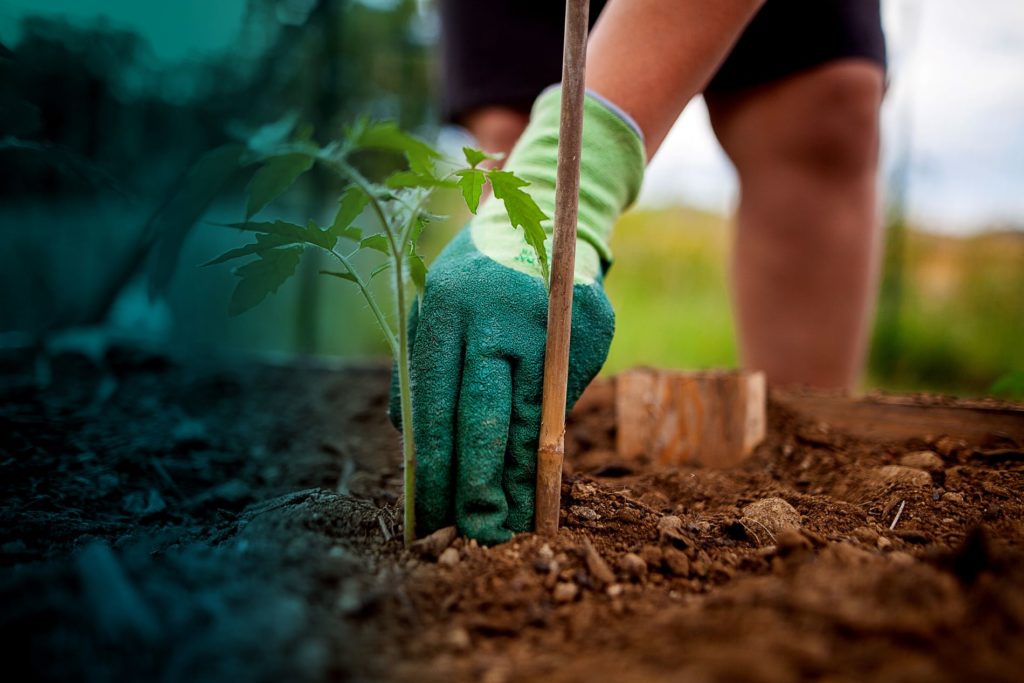Expert
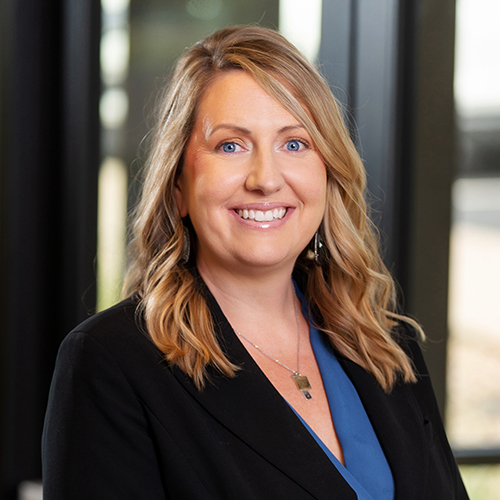
Jackie Gatz
Actions
Type
Topic
- Health Equity
- Population Health
Tags
The following two case studies exemplify how hospitals in Missouri are focusing on health equity-centered care and implementing strategies to improve the health of their communities.
The first case study features work underway at University Health in Kansas City, Mo., that is designed to promote health equity by addressing social determinants of health.
The second case study highlights efforts at BJC HealthCare in St. Louis that is designed to promote health equity through an anchor institution model.
Guidance Document
These case studies are featured in the guide, “A Fair and Just Opportunity for Health: Hospitals Creating Health Equity in Missouri.”
Driving Health Equity at University Health
University Health is the Kansas City area’s only essential safety net hospital, providing “care for all” regardless of ability to pay. Many of UH’s patients find themselves in a daily struggle with the complex social needs known to directly affect health. Poverty, homelessness, food insecurity, language barriers and other social issues faced by many of the patients are known to create disparities in health, treatment and access to care. UH is committed to identifying and addressing these factors, both within the walls of the organization and in collaboration with others in the community at large.
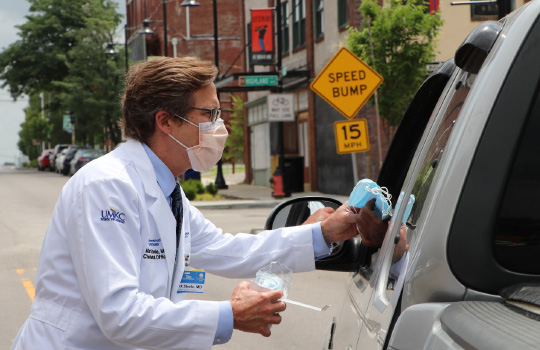
UH is utilizing a multifaceted approach to address health equity in Kansas City. Below are key strategies.
Collaborative Community Efforts – UH is collaborating with other health care and community organizations in the Kansas City metro area to strengthen communication and create plans of action between organizations.
- Kansas City Health Equity Action Community: UH is working together with other organizations throughout Kansas City to develop and implement plans of action to “catalyze and sustain equity-centered and culturally responsive health care that yields equitable health outcomes for all.”
- KC Health Collaborative: UH staff participates in this collaborative with the goal of developing and implementing a communitywide plan of screening, referral and follow-up for the SDOH faced by those they serve. Individuals on this committee represent numerous health systems, schools and social service agencies.
- Mattie Rhodes Health Literacy Committee: UH sits at the table with other community agencies and health centers to address health literacy within the Kansas City community.
Community Engagement:
The Community Health Strategies & Innovation department strategically partners with community stakeholders to develop sustainable programs that achieve impactful outcomes. The department consists of three branches: Community Health, Nutrition Education and Education Services.
- The Community Health division implements initiatives such as immunization clinics, weight loss challenges and chronic disease self-management classes. Solutions are tailored to the health issues of the community, allowing community members to advocate for their own health while taking the proper steps to reduce the risk of chronic disease and emergency department visits.
- Nutrition Education and the Healthy Harvest Mobile Market implement a “classroom on wheels” to travel throughout the community with a focus on assisting individuals in acquiring knowledge and changing behaviors necessary for living a lifestyle of healthy nutrition practices.
- The Education Services branch of the CHS&I department aims to expose high school students to different career opportunities within the health care industry.
- COVID-19: The CHS&I department, in partnership with 20-plus community centers and churches in low-income areas, worked to bring no-cost fruits and vegetables to individuals in targeted ZIP codes, helping to relieve hunger for over 140,000 community members during the COVID-19 pandemic. The community team screened 1,286 community members for COVID-19 and provided 969 COVID-19 vaccines to families in these targeted areas.
Department of Equity, Diversity and Inclusion:
UH’s Department of Equity, Diversity and Inclusion’s mission is to provide EDI expertise and programmatic support to UH leadership and staff to advance UH as an equitable and inclusive place to receive health care, to work and to learn. The vision of this work is to create a diverse, equitable, inclusive and welcoming environment for UH’s patients, staff, suppliers and the community that results in positive health care outcomes. EDI activities supporting this vision include the following.
- Provide coaching, development and training.
- An annual compliance module on EDI practices focuses on bias in medical care.
- In-person workshops are offered to teams and departments on bias in health care and microaggressions.
- An Ambassadors Council was developed that is open to front-line and administrative staff. Members receive nine months of EDI development that prepares them to return to their teams/departments and serve as a liaison for EDI matters in their assigned areas.
- An EDI Council was established within the nursing shared governance structure.
- Project LEAD, a 12-month pilot program, has a goal of increasing diversity in the leadership of the organization by broadening the pool of diverse candidates.
- An overview of the EDI department is highlighted during new hire orientation, including support provided to staff and departments throughout the organization.
- The Health Equity Committee brings together representation from numerous areas of the hospital to explore existing practices and develop plans of improvement in the areas of collection and use of race, ethnicity and language data, a review of policies and practices using an equity lens, clinical practices, and development and monitoring of a health equity plan.
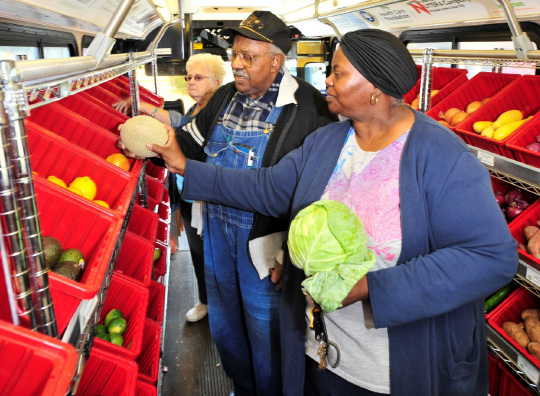
Social Determinants of Health Screening:
UH developed a screening methodology for its clinics to screen patients for the most identified challenges.
- Provided nearly $3.4 million in housing stabilization assistance annually, including rent, utilities, etc.
- Assisted approximately 150 clients per year in securing competitive employment.
- Partnered with Preservation of Affordable Housing, a nonprofit developer, owner and operator of more than 12,000 affordable homes, to promote resiliency in affordable housing through trauma-informed interventions in property management, resident services and physical design.
Cultural Health Navigation:The organization created a hybrid position, which allows for medical interpreters to also serve as the patient’s advocates and navigators. Food Equity Grant Committee:With funding assistance from the Health Forward Foundation, UH invites and facilitates the efforts of an increasing number of representatives from Kansas City’s health care and community support organizations to learn together and develop programming that serves to support the nutritional needs of the immigrant, refugee and disadvantaged populations they serve. |
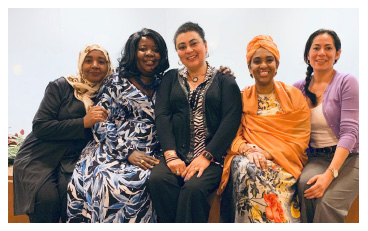
Cultural Health Navigators serve as language interpreters for patients as well as the patient’s advocates. |
On-site Food Pantry:
To provide immediate assistance to those experiencing hunger, UH, in partnership with Harvesters, opened “One World Pantry,” an on-site food pantry providing immediate assistance to both patients and staff members alike.
BJC HealthCare Community Health Improvement
BJC HealthCare in March 2022 introduced its community health improvement strategic plan, leadership team and first regional partnerships to alleviate health inequities across the St. Louis region.
“Research and reports, such as For the Sake of All, repeatedly point to socioeconomic factors, including poverty, education, housing and inequality, as having the greatest impact on health,” says Rich Liekweg, BJC HealthCare President and Chief Executive Officer. “One of the jarring data points cited in that report is that people in affluent communities live an average of 18 years longer than those in under-resourced communities just a few miles away. At BJC, we are committed to changing disparities like that.”
To accomplish this, BJC is working alongside groups that make up the fabric of under-resourced neighborhoods and is striving to bring a holistic approach to improving physical, mental and financial well-being. Addressing the root causes of health problems, especially those that disproportionately affect ZIP codes where there has been under-investment, will lead to increased wellness and greater overall quality of life.
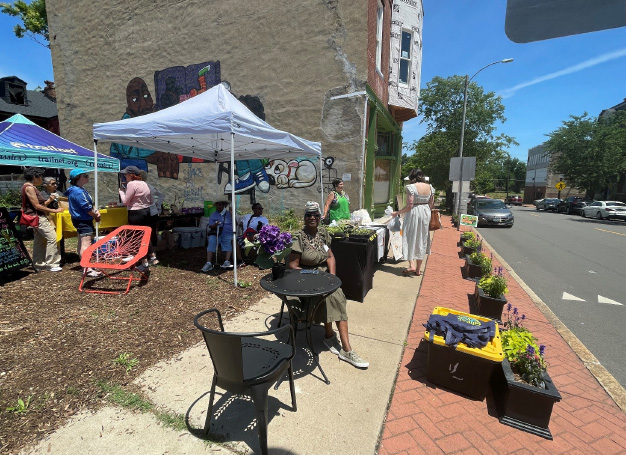
BJC is working with communities in the City of St. Louis and North St. Louis County most impacted by inequities and will focus support around four areas significant to health and well-being: financial investment in the community, diabetes and healthy food access, infant and maternal health, and school health and wellness. BJC went through a very robust planning process with engagement from internal stakeholders and the community to determine these focus areas.
“We cannot improve community health without the community,” says Jason Purnell, Ph.D., MPH, BJC Vice President of Community Health Improvement. “This inclusive process gave us time to authentically listen and learn. We are committed to acting on what we heard and are excited to work in partnership with the communities we serve to address these issues.”
In September 2021, BJC HealthCare’s board of directors and executive leadership team endorsed the plan.
BJC recruited a talented and diverse leadership team to advance its commitment to community health improvement. Joining Dr. Purnell’s leadership team are Karlos Bledsoe, Director, Strategy and Operations; Doneisha Bohannon, Director, Community Health Partnerships and Collaboration; and Christopher Nolan, Director, Anchor Initiatives. This team is primarily responsible for working collaboratively throughout BJC and with community partners and residents to co-design and amplify efforts that address health inequities.
BJC cannot do this work alone or in a silo. It has developed and expanded relationships with partners in the community to help advance efforts in these focus areas while addressing other critical needs. “Our work is well underway in a number of areas,” noted Dr. Purnell. “We’ve responded to urgent needs in the community during the pandemic by partnering with various churches, businesses and community organizations across St. Louis to deliver COVID-19 vaccinations equitably.”
Some of the other initial partnerships include Midwest BankCentre and St. Louis Community Credit Union, two financial institutions that have a shared mission of improving health and economic well-being. BJC recently developed a depository relationship with these two local institutions to address a historic lack of investment in the City of St. Louis and North St. Louis County. The deposits will be used to create loans to invest in these communities, including support for entrepreneurs to start and grow businesses and for individuals to realize the dream of home ownership. BJC also is partnering with colleagues at Christian Hospital, and community partners North Sarah Food Hub by Holistic Organic Sustainable Cooperatives, Operation Food Search and My Blooming Health Lab to provide healthy meals, nutritional counseling and social needs assistance to address food insecurity and uncontrolled diabetes in North St. Louis.
When the Be Well Farmers Market opened for the season at the corner of Salisbury Street and North Florissant Avenue in the Hyde Park neighborhood of North St. Louis, fitness instructors from Move by BJC were on hand to offer tai chi and yoga demonstrations among the samplings of flavorful teas, fresh herbs, locally grown produce and handmade items from local vendors. BJC CHI is partnering with the Be Well Farmers Market in 2022 to increase access to healthy and affordable food, along with access to free exercise demonstrations and health screenings. The market brings together urban farmers and growers, artisans, health providers, and food trucks.
“Similar to the American Hospital Association’s definition, I define health equity as “’the attainment of the highest level of health for all people.’” To reach that, it is imperative to find a way to dismantle the historic systems and structures that make achieving those realizations difficult and, at times, seemingly impossible. We must acknowledge the lived experience of those most profoundly impacted while bringing forward the undeniable data that presents a call to action. Anchor institutions, specifically health care organizations, must establish bold strategic priorities that will eliminate such glaring inequities. Otherwise, health disparities will continue to worsen and disproportionately impact our most vulnerable communities, most often our communities of color and of lower social economic status.”
— Steven Player, PharmD, MBA, CDM,
VP Diversity, Equity and Inclusion, BJC HealthCare
“These early partnerships help to address the wealth and health gap, food insecurity, and diabetes disparities,” said Dr. Purnell. “We are meeting people in their neighborhoods and working collaboratively with partners to address disparities. We are continuing to identify partners and build relationships across our region to help move the needle in these focus areas.”
“We recognize that to focus on improvement of community health is to focus on a long-term goal,” Liekweg adds. “We envision a thriving bistate region in which all people have an equal opportunity to live their healthiest lives.”
Learn more about BJC’s ongoing community health improvement work, and how to get involved.
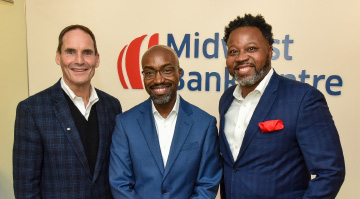
(L to R) BJC President and CEO Rich Liekweg and BJC Vice President of Community Health Improvement Jason Purnell joined Midwest BankCentre Chairman and CEO Orvin Kimbrough to announce a new BJC depository relationship designed to spur financial growth in historically under-resourced communities.
|
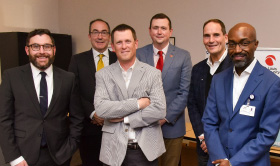
St. Louis Community Credit Union and BJC are also partnering on a depository relationship to facilitate greater opportunity for loan support for businesses and homebuyers in North St. Louis communities. Pictured left to right are BJC director of anchor initiatives Christopher Nolan, BJC chief investment officer and treasurer Joseph Thomas, SLCCU president and CEO Kirk Mills, SLCCU vice president of community development Paul Woodruff, BJC president and CEO Rich Liekweg and BJC vice president of community health improvement Jason Purnell. |









